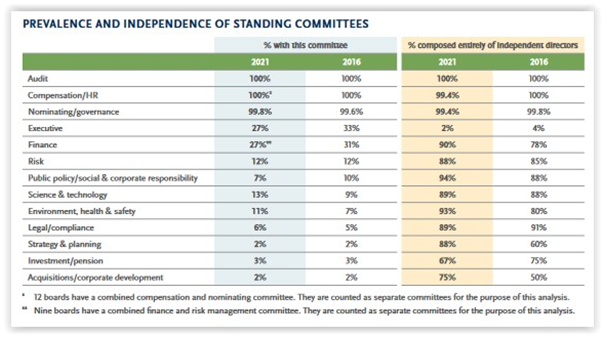Among the share-worthy takeaways from Spencer Stuart’s annual S&P 500 Board Index are these:
New independent directors
- New director demographics - 456 new independent directors were added over the past year to the 493 boards included in the 2021 index. Of those new directors, 72% are from historically underrepresented groups. Nearly half (47%) are Black/African American, Asian, Hispanic/Latino/a, American Indian/Alaska native or multiracial, and 43% are women.
- All S&P 500 directors - Women represent 30% of all directors on these boards and 21% are racially/ethnically diverse.
- Diversity tactic - Notably, 78 boards increased their size over the past year to add a female director and 88 boards increased their size to add racial/ethnic diversity (on a net basis after independent director departures).
- Industry backgrounds - The Consumer, Technology, and Industrial sectors sourced the most new independent directors at 16%, 15%, and 10%, respectively.
Board refreshment practices
- Mandatory retirement - 70% of boards have a mandatory retirement age, most commonly 75 and older.
- Term - Just 6% of boards (31 companies) have term limits, most commonly 15 years of more.
- Tenure - Most boards have an average tenure of between six and 10 years; the median independent director tenure is six years and the average is 7.7 years.
Standing committees
Always a keen topic of interest, here is the breakdown on board committee structures in 2021 as compared to 2016:
 Board evaluation practices
Board evaluation practices
Among boards reporting some form of evaluation (98%):
- 45% reported evaluating the full board, board committees, and individual directors; 47% reported evaluating the full board and committees; and 6% reported evaluating the full board only.
- 47% of boards - up from 34% ten years ago - disclosed conducting some form of individual director evaluations.
- 22% of boards disclosed they engaged an independent third-party governance expert to facilitate the evaluation process. A number of these boards indicate that they use an outside facilitator “periodically” or every two or three years.
Access additional information & resources on our Board Practices/Governance Practices page.
This post first appeared in the weekly Society Alert!